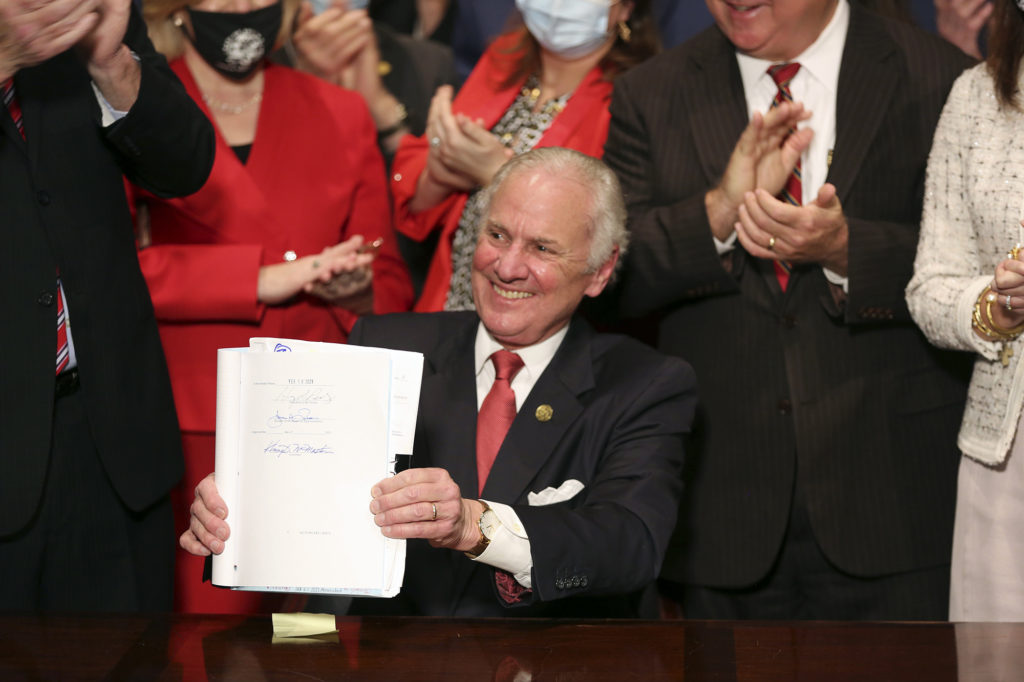
COLUMBIA, S.C. (AP) – South Carolina’s new law banning most abortions was suspended by a federal judge Friday (Feb. 19) on its second day in effect.
Judge Mary Geiger Lewis put a 14-day temporary restraining order on the law and will renew it until she can hold a more substantial hearing March 9 on Planned Parenthood’s request that it not be enforced until the group’s lawsuit against South Carolina is resolved.
Gov. Henry McMaster signed the bill into law Thursday less than an hour after it was sent to him, but the national reproductive health services organization sued even before the governor put ink to paper.
“The pro-life movement will not be deterred or discouraged by the court’s order,” said Chelsea Sobolik, policy director of the Ethics & Religious Liberty Commission. “Vulnerable children deserve protection by the full extent of the law as South Carolina’s leaders understand and, thankfully, they will continue to defend this lifesaving protection in court. The effort to make abortion unthinkable is multifaceted, and we will work to make the most of each step to move the nation’s conscience and laws toward justice.”
In court documents, Planned Parenthood and The Center for Reproductive Rights said the temporary restraining order was requested in part because more than 75 women were scheduled to have abortions in the state over the following three days, and most of them would be banned under the new law.
The South Carolina Fetal Heartbeat and Protection from Abortion Act is similar to laws that a dozen states have previously passed. All were stopped from taking effect and currently are tied up in court. Federal law, which takes precedence over state law, currently allows abortion.
Planned Parenthood’s lawyers said South Carolina is “openly flouting this law.”
The South Carolina Attorney General’s Office said in court papers filed Friday morning that Planned Parenthood can’t be sure the law will be rejected by the U.S. Supreme Court. With three justices appointed by former President Donald Trump, they said, the court could overturn Roe v. Wade, the 1973 decision supporting abortion rights.
Lewis said that was not for her to determine. She was quoted by news outlets as saying Friday that South Carolina’s new law was stricter than the current U.S. Supreme Court rulings she must abide by.
The bill’s proponents celebrated in the Statehouse lobby outside the House chambers as members gave the bill final approval on Thursday. Standing shoulder to shoulder, they sang “Praise God” to the tune of “Amazing Grace” after the Republican governor held up the new law so they could see his signature.
The law requires doctors to perform ultrasounds to check for a heartbeat in the fetus, which can typically be detected about six weeks after conception. If one is detected, the abortion can be performed only if the pregnancy was caused by rape or incest or the mother’s life is in danger.
The U.S. Supreme Court has struck down state laws that prevent abortions before a fetus can live outside the womb.
Planned Parenthood lawyers noted that South Carolina legislators this year did not change part of state law that said fetuses are considered viable in the 24th week of pregnancy.
Lawyers for the state are making a different argument: that a heartbeat in a fetus is an important milestone in a pregnancy. They cite the new law, which states that “contemporary medical research” has found “fewer than 5 percent of all natural pregnancies end in spontaneous miscarriage after the detection of a fetal heartbeat.”
The new law does not punish a pregnant woman for getting an illegal abortion, but the person who performs the procedure can be charged with a felony, sentenced up to two years and fined $10,000 if found guilty.
From The Associated Press. May not be republished. Baptist Press staff contributed to this report.














